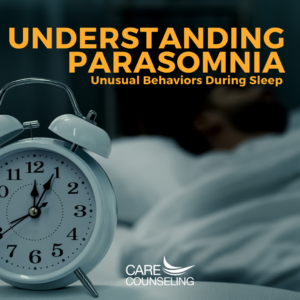Understanding Parasomnia: Unusual Behaviors During Sleep
 Sleep is a vital part of our daily lives, allowing our bodies and minds to rest and rejuvenate. However, for some individuals, the world of sleep is not as peaceful as it may seem. Parasomnias are a group of sleep disorders that involve abnormal behaviors, movements, and experiences during sleep. These unusual occurrences can range from simple, harmless actions to more complex and potentially dangerous behaviors.
Sleep is a vital part of our daily lives, allowing our bodies and minds to rest and rejuvenate. However, for some individuals, the world of sleep is not as peaceful as it may seem. Parasomnias are a group of sleep disorders that involve abnormal behaviors, movements, and experiences during sleep. These unusual occurrences can range from simple, harmless actions to more complex and potentially dangerous behaviors.
- What is Parasomnia?
Parasomnia is a term that encompasses a variety of unusual behaviors, movements, and experiences during sleep. These events occur outside the typical sleep cycle and can be classified into two main categories: non-REM (rapid eye movement) parasomnias and REM parasomnias.
- Non-REM Parasomnias: These parasomnias occur during the deeper stages of non-REM sleep. They can include behaviors like sleepwalking, night terrors, sleep-related eating disorder, and confusional arousals.
- REM Parasomnias: These parasomnias occur during the REM sleep stage and can involve vivid dreams, vocalizations, and sudden, jerky movements, such as REM behavior disorder.
- Common Types of Parasomnia
Let’s explore some of the most common forms of parasomnia in more detail:
- Sleepwalking (Somnambulism): Sleepwalking involves a person getting out of bed and walking or performing activities while still asleep. They may have a blank expression and are often unaware of their surroundings. Sleepwalkers can sometimes perform complex actions or even leave their homes while asleep.
- Night Terrors: Night terrors are intense episodes of fear or terror that can cause someone to scream, cry, or appear highly agitated during sleep. These episodes are often accompanied by an increased heart rate, sweating, and confusion upon awakening.
- Sleep-Related Eating Disorder (SRED): SRED involves consuming food and drinks while asleep, with little or no recollection of these actions upon awakening. Individuals with SRED may eat large quantities of food, leading to weight gain and health concerns.
- REM Behavior Disorder (RBD): RBD is characterized by vivid and often disturbing dreams during the REM sleep stage. It can lead to physically acting out these dreams, which may result in injury to the person or their sleep partner.
- Exploding Head Syndrome: This parasomnia involves hearing loud, imaginary noises, such as an explosion or a gunshot, when falling asleep or waking up. These sounds are not real but can be distressing.
- Causes and Triggers of Parasomnia
Parasomnia can have various triggers and causes, which can include:
- Genetics: A family history of parasomnia may increase the likelihood of an individual developing these sleep disorders.
- Stress and Anxiety: High levels of stress, anxiety, or unresolved emotional issues can trigger or exacerbate parasomnia episodes.
- Medications and Substances: Some medications or substances, including alcohol, sleep aids, and stimulants, can increase the risk of parasomnia.
- Sleep Deprivation: A lack of sufficient sleep or irregular sleep patterns can contribute to the development of parasomnia.
- Medical Conditions: Certain medical conditions, such as epilepsy, sleep apnea, or other sleep disorders, may be associated with parasomnia.
- Management and Treatment
Managing parasomnia involves several strategies to reduce the frequency and severity of episodes:
- Improve Sleep Hygiene: Establishing a regular sleep schedule, creating a comfortable sleep environment, and avoiding stimulants like caffeine and alcohol can help improve sleep quality and reduce parasomnia episodes.
- Stress Management: Engaging in stress-reduction techniques, such as relaxation exercises or therapy, can help individuals with stress-related parasomnia.
- Medications: In some cases, doctors may prescribe medications to manage specific parasomnia symptoms, such as those associated with RBD.
- Behavioral Therapy: Behavioral therapies, including cognitive-behavioral therapy (CBT), can help individuals better understand and cope with their parasomnia.
- Safety Measures: For individuals who engage in potentially dangerous behaviors during parasomnia episodes, safety measures should be taken. This can include securing the sleep environment, using baby gates to prevent sleepwalking, or taking precautions to avoid injury during episodes.
- Seeking Professional Help
If parasomnia is causing distress, interfering with daily life, or posing safety concerns, it is essential to seek professional help. A healthcare provider or sleep specialist can diagnose and provide guidance on the most appropriate treatment options. They may recommend a sleep study (polysomnography) to monitor sleep patterns and identify the specific type of parasomnia.
Parasomnia is a group of sleep disorders that can lead to unusual and sometimes unsettling behaviors, movements, and experiences during sleep.
Understanding the causes and triggers, practicing good sleep hygiene, seeking professional help when necessary, and implementing safety measures can go a long way in managing parasomnia. By addressing these sleep-related disturbances, individuals can improve their sleep quality and overall well-being, allowing them to enjoy more peaceful nights.



























